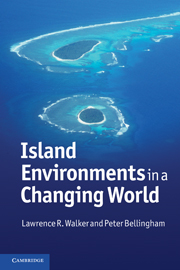Book contents
- Frontmatter
- Contents
- Preface
- Photo credits
- 1 Introduction to island environments and cultures
- 2 The physical setting
- 3 Natural disturbances on islands
- 4 The plants and animals of islands
- 5 Human dispersal, colonization, and early environmental impacts
- 6 Intensifying human impacts on islands
- 7 Islands in the modern world, 1950–2000
- 8 The future of island ecosystems: remoteness lost
- Glossary
- Index
- Plate section
- References
8 - The future of island ecosystems: remoteness lost
Published online by Cambridge University Press: 05 June 2012
- Frontmatter
- Contents
- Preface
- Photo credits
- 1 Introduction to island environments and cultures
- 2 The physical setting
- 3 Natural disturbances on islands
- 4 The plants and animals of islands
- 5 Human dispersal, colonization, and early environmental impacts
- 6 Intensifying human impacts on islands
- 7 Islands in the modern world, 1950–2000
- 8 The future of island ecosystems: remoteness lost
- Glossary
- Index
- Plate section
- References
Summary
INTRODUCTION
As biologists we are trained to observe natural patterns in the environment and examine how these patterns change over time. Yet, whenever we attempt to make predictions about future changes, inevitably we are humbled by the variability in ecosystem responses to disturbance. On the one hand, island ecosystems are under great strain from increasing human populations, global climate change, environmental destruction, and exploitation of natural resources. On the other hand, some island ecosystems rebound remarkably quickly when left undisturbed, especially if critical thresholds have not been reached. Predictions are further complicated because economic forces can both exacerbate and reduce impacts of disturbance, and human intervention can sometimes successfully address challenges such as erosion control, invasive species, and habitat restoration. Therefore, precise predictions about the future of any given ecosystem are unlikely. Despite variation across the nine island groups in size, geology, climate, disturbance history, and human impacts, some common patterns of ecosystem responses to disturbance emerge that suggest a common future. In this chapter, we present our views of some of the challenges that face island ecosystems and some of the constructive approaches being used to address these challenges. We then consider the broader implications of lessons we have learned from the nine island groups.
- Type
- Chapter
- Information
- Island Environments in a Changing World , pp. 293 - 306Publisher: Cambridge University PressPrint publication year: 2011
References
- 1
- Cited by



